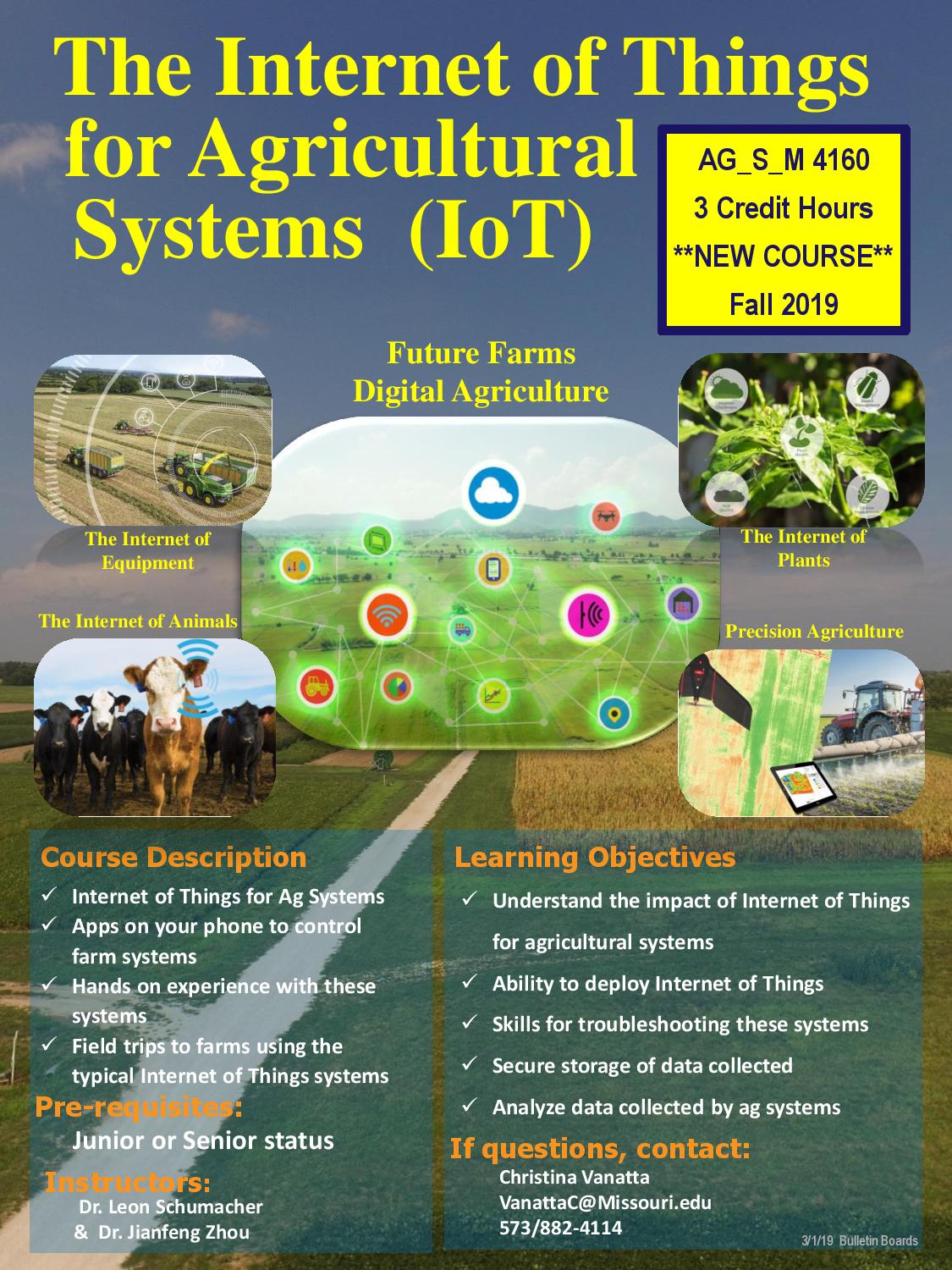Download the full Syllabus.
Course description:
Introduction to basic concepts and applications of Internet of Things (IoT) technology in agriculture, and its impacts on farming and agricultural industry. Show-case of typical IoT systems used in farms, on farm equipment and in cloud. Hands on experience on essential IoT components, including hardware (wireless sensors, controllers, computers and network devices) and software.
Course Purpose:
The farming and agricultural industry relies on innovative ideas and technological advancements to help increase yields and better allocate resources. Just like the impact of mechanical innovations in late 19th century and the 20th century on agriculture, IoT is a driving force behind increased agricultural production at a lower. IoT leaves the door wide open for engineers looking to bring a smart farming solution and has great potential to impact how individuals live and work by providing a source of innovative decision making. The design of the IoT, which is defined as “an internetwork of physical items – each embedded with sensors – that are connected to the Internet”, requires the understanding of embedded electronics, software, sensors, network, and data analytics. To prepare our students as forerunners of this future, this course will introduce a wide range of topics in the broad areas of IoT, and provide hands-on experiences via a series of exciting projects.
Course Objectives:
At the close of the course students will be able to:
1. Understand how IoT technologies can be used in agriculture systems and affect an agriculture business;
2. Understand the concept of IoT systems and its major architecture and components;
3. Know typical IoT agricultural systems, understand the architecture and functionalities;
4. Understand how to collect and analyze data with IoT for precision agriculture systems and strategically store and share data for public access;
5. Know basic statistical tools that can be used to analyze the data collected in modern agriculture business.
Tentative lecture schedule:
| Week | Topics | Assignment |
| Week 1 | Course overview
Special topic (1): An overview of IOT in agriculture: potential and challenge |
Discussions: application of IoT in agriculture |
| Week 2 | Architecture and components of a typical IoT system | |
| Week 3 | Feeling Things: typical sensors and sensor nodes used in Ag, such as weather, soil, air and crops | |
| Week 4 | Tag Things: technology available to tag things, such as RFID, bar code
Acting Things: typical actuators in agricultural applications |
Summarize the work principle of at least four sensors and discuss how they can be part of IoT. |
| Week 5 | Thinking Things: embedded and single chip controllers | How to select controllers |
| Week 6 | Connectivity and networks: wired and wireless technology | |
| Week 7 | Security
Exam 1: |
How to setup a server for IoT systems |
| Week 8 | Conceptual design: Smart irrigation | Group discussion: smart irrigation system |
| Week 9 | Guest lecture: Microsoft FarmBeats
Sensors and microcontrollers |
|
| Week 10 | Guest lecture: Dr. Calyam — Edge Computing for IoT-based Systems – Performance and Security Considerations
IoT server setup |
|
| Week 11 | Guest lecture: IOT America
Special topic (2): IoT in field management |
|
| Week 12 | Special topic (3): IoT in irrigation management | |
| Week 13 | Special topic (4): IoT in livestock management | |
| Thanksgiving Break | ||
| Week 15 | Guest lecture: AGCO
Special topic (5): IoT in and smart field equipment |
Course report: summarize the potential applications of IOT in your future work. |
| Week 16 | Student Project Presentations | |
| Finals | No class | |
Note: Schedule is subject to change.
Student project: No more three students will work on a topic.
Guest Speakers: Part of special topics will be covered by Visiting speakers from academic and industrial partners (for example Climate Fieldview, Farmoile, CropTrak, Topcon, Microsoft) who will be invited to share their perspective on the current state-of-the-art in the IoT industry.
Laboratory Activities, Fall Semester, 2019
| # | Lab | Subject | |
| Week 1 | 1 | Introduction | (1) IoT system overview. (2) Lab and equipment tour. (3) Lab requirement and rules |
| Week 2 | 2 | Network devices (1) | Ethernet modem, router, switch, hub and connection; Ethernet cables |
| Week 3 | 3 | Network devices (2) | Connection, setup and trouble shooting
Ethernet cables, installation and maintenance |
| Week 4 | 4 | Network devices (3) | |
| Week 5 | 5 | Manageable switches and Point to point setup (bridge) | |
| Week 6 | 6 | Security camera setup | |
| Week 7 | 7 | Field trip (1) | Data center |
| Week 8 | 8 | Smart irrigation systems | |
| Week 9 | 9 | IoT system – sensors (T & RH sensor), controllers and data loggers (Pi and Arduino) | |
| Week 10 | 10 | IoT system – Wireless communication (node and gateway: LoRa/BT/ZigBee)) | |
| Week 11 | 11 | Field trip (2) | TBD |
| Week 12 | 12 | Special Lab: IoT America | |
| Week 13 | 13 | IoT system – IoT platform | |
| Week 14 | Fall break | ||
| Week 15 | 14 | TBD | |
| Week 16 | 15 | Course project review | |
| Finals | No lab | ||
Note: Schedule is subject to change.

